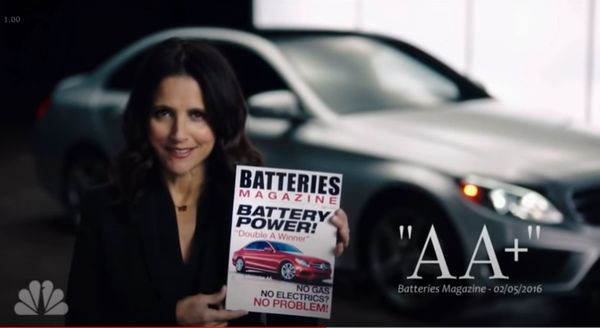Interesting Take on Electric Cars
Dec 3, 2020 12:57:14 #
Scruples wrote:
This must be it:There was an interesting and hilarious skit on Saturday Night Live. Featuring Julia Louis Dreyfus, she is the supposed spokeswoman for the new car, Mercedes AA Class. It uses over 9 thousand batteries to power the car to 52 mph. It becomes interesting when you need to replace those batteries. I tried to place a link but had difficulty. You could Google for a video of the skit.
https://www.youtube.com/watch?v=0k1tbf8muMc

Dec 3, 2020 15:09:55 #
chase4 wrote:
Perhaps $50/year is less than you might be paying in gas/road tax? I don't know about your state taxes. chase
Nope. It’s my wife’s car, and considering the few miles we drive it, the $50 is more. That’s about 10 gallons per month x taxes doesn’t equal the $100 we have paid for extra registration. We are behind. Most of our miles go on my F150.
Dec 3, 2020 17:45:01 #
chase4 wrote:
Interested in what the engineers or others with kn... (show quote)
An amazing amount of misinformation (and downright falsehoods) in a single post. I won’t even start to tear it apart, but just let me start with the absurd $1.16 per KWH. It varies across the country, but here in N.C., depending on your billing plan, it probably averages $.08 per KWH. The fact that the thread you posted is off by about 15x should be enough to discount this entire BS without going any further. Alternate facts.
Dec 3, 2020 20:11:44 #
Bbarn
Loc: Ohio
EVs aren't especially energy effecient. Battery charging losses are considerable, requiring about 100 watts to store 60 watts. Motor losses are fairly small, yielding around 90 watts out from 100 watts in (very good). Braking regen (battery charging from braking) helps some, but the losses there are significant as well, so perhaps only half of that enery is recovered.
Nothing wrong with exploring and developing EV technology. But its best done as a natural progression as opposed to a forced solution. The latter approach will not yield the best benefits in their time.
Nothing wrong with exploring and developing EV technology. But its best done as a natural progression as opposed to a forced solution. The latter approach will not yield the best benefits in their time.
Dec 3, 2020 20:25:16 #
PhotogHobbyist wrote:
I saw an article recently (can't recall where on t... (show quote)
I don’t have a clue on what will be our children’s future. It does seem very grim.
On Star Trek they never had this problem. They just turned on the dilithium crystals.
We are painting our selves into a corner and into a closet.
Dec 3, 2020 20:48:38 #
Bbarn wrote:
EVs aren't especially energy effecient. Battery c... (show quote)
I’m curious where your 60% charge-discharge efficiency numbers are from (references please) - all the data I see on DC charge to DC discharge energy efficiency is in the 80-90% range for Li Ion batteries.
Dec 3, 2020 21:48:34 #
Bbarn
Loc: Ohio
That was older tech batteries. Seems Li Ion are better.
2013 Chevy Volt required 14.4kWh of charge (120V*12A*10hr) to replace 10.8kWh of battery energy, which translates to 75%. Those numbers are for a new battery. The efficiency goes down with age/use. Probably better than 75% now.
2013 Chevy Volt required 14.4kWh of charge (120V*12A*10hr) to replace 10.8kWh of battery energy, which translates to 75%. Those numbers are for a new battery. The efficiency goes down with age/use. Probably better than 75% now.
Dec 3, 2020 23:57:30 #
LWW wrote:
Yet somehow auto emissions are a fraction of what they were in 1960 and proven oil reserves are at an all time high.
Emissions are at an all time low because of computer engine management technology. And yes, even though we have an abundance of oil today due to fracking, tar sands extraction and better automobile fuel economy (also due to computer engine management), there IS an end to oil and natural gas, and we better save as much as we can for those uses, such as aircraft, that are not readily convertible to nuclear or electric power.
Dec 4, 2020 00:04:29 #
Gasman57 wrote:
Solar and wind power technology are not viable at this time in history. The technology is not cost effective and brings many problems to the table. Fossil fuels are in abundance and not running out for many, many decades, if at all in our lifetime. Alternative fuel sources should be investigated, but not to replace proven fuels until they are proven reliable. This topic should not be driven by political ideology, but science.
But they WILL run out, and unless some new technology appears, you may not like it, but the only viable current alternative for base generating capacity is nuclear.
Dec 4, 2020 05:50:54 #
The only part I agree with is the the statement that it has not been fully discussed.
One thing I'm sure of though is that 'if things don't change they'll stay as they are' and that's not a good place to be now that we think we know better.
Will electric cars drive a battery revolution similar to the mobiles. We'll have to wait and see.
One thing I'm sure of though is that 'if things don't change they'll stay as they are' and that's not a good place to be now that we think we know better.
Will electric cars drive a battery revolution similar to the mobiles. We'll have to wait and see.
Dec 4, 2020 05:55:38 #
TriX wrote:
But they WILL run out, and unless some new technology appears, you may not like it, but the only viable current alternative for base generating capacity is nuclear.
It's not a question of me liking it or not. The problems start when these technologies are in their infancy and forced into use. Can you imagine if we used unproven technology in our space program.
Dec 4, 2020 07:06:55 #
In its current state, alternative energy is merely a supplemental source of energy and cannot be used effectively or efficiently as a replacement for fossil fuels. Like many others, I like the idea of getting something for nothing, but we all know that is not possible. The problem as I understand it is excessive carbon emissions that need to be curtailed. The simplest solution to the problem is to reduce the demand for energy. It is the rapid increase in the human population of the world that creates the growing demand. To me, the most direct approach would be to address the population problem; although it is a difficult problem.
Dec 4, 2020 07:24:29 #
John Matthews
Loc: Wasilla, Alaska
13 wrote:
Electrical cars won't work where it's cold...below freezing. Not that I'm aware of.
I live in Alaska and I am startled to read this because my neighbor drives his Tesla all winter long.
Dec 4, 2020 07:38:06 #
Bbarn
Loc: Ohio
Battery capacity is reduced as temp drops. So driving range is reduced, and running the heater reduces it more.
Dec 4, 2020 07:40:00 #
chase4 wrote:
Interested in what the engineers or others with kn... (show quote)
First, the author needs to research a little deeper and make sure he is getting his facts correct. Unless you are living in an isolated wilderness with a special generator supplying your electricity, I think your cost of $1.16 per kwh is an order of magnitude too high. Local energy prices in my area average around $0.11-0.12 (11-12 cents) per kwh. That makes all your calculations completely wrong.
However, some of your thoughts have merit. Electric cars are not and may never be for everyone. Loading up the family and driving 500-600 miles in a day may never be possible in an electric. But for many people who NEVER take long trips in a car and only do local shopping and travel, it could be ideal. It cuts maintenance to near zero and greatly reduces emissions. Since the car spends much of its time at home slow charging overnight or even spread across several days is not an issue. Most of the estimates for greatly increased power is for quick charging in a few hours. Cars that are infrequently used can be charged much slower and efficiently, spreading the energy use across a longer period.
Humans tend to think of solutions to problems as one size must fit all. With current technology, there may NOT be one solution to fix our energy problems AND have a clean environment. But with the combination of several technologies such as solar, wind, hydro, nuclear and natural gas a significant impact can be made. I live in an area that used cheap coal for power generation for many years. The plant produced smoke which in turn produced acidified rain which caused issues in streams and forest areas. It also produced mountains of ash, which when it escaped containment, caused tremendous pollution in local streams and lakes. Several years ago, this plant converted to natural gas and the pollution was much reduced and the ash eliminated. The air and water since then is considerably cleaner.
I think there is a place for electric cars and just as LED lights have made an impact on energy consumption, electric cars will make an impact in pollution reduction and even costs of ownership for owners.
If you want to reply, then register here. Registration is free and your account is created instantly, so you can post right away.






